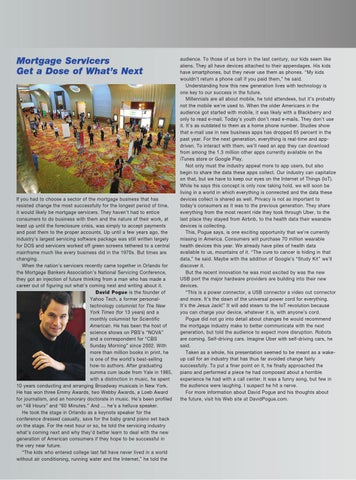Mortgage Servicers Get a Dose of What’s Next
APRIL 2016 n Georgia Mortgage Professional Magazine n
NationalMortgageProfessional.com
44
If you had to choose a sector of the mortgage business that has resisted change the most successfully for the longest period of time, it would likely be mortgage servicers. They haven’t had to entice consumers to do business with them and the nature of their work, at least up until the foreclosure crisis, was simply to accept payments and post them to the proper accounts. Up until a few years ago, the industry’s largest servicing software package was still written largely for DOS and servicers worked off green screens tethered to a central mainframe much like every business did in the 1970s. But times are changing. When the nation’s servicers recently came together in Orlando for the Mortgage Bankers Association’s National Servicing Conference, they got an injection of future thinking from a man who has made a career out of figuring out what’s coming next and writing about it. David Pogue is the founder of Yahoo Tech, a former personaltechnology columnist for The New York Times (for 13 years) and a monthly columnist for Scientific American. He has been the host of science shows on PBS’s “NOVA” and a correspondent for “CBS Sunday Morning” since 2002. With more than million books in print, he is one of the world’s best-selling how-to authors. After graduating summa cum laude from Yale in 1985, with a distinction in music, he spent 10 years conducting and arranging Broadway musicals in New York. He has won three Emmy Awards, two Webby Awards, a Loeb Award for journalism, and an honorary doctorate in music. He’s been profiled on “48 Hours” and “60 Minutes.” And … he’s a helluva speaker. He took the stage in Orlando as a keynote speaker for the conference dressed casually, save for the baby grand piano set back on the stage. For the next hour or so, he told the servicing industry what’s coming next and why they’d better learn to deal with the new generation of American consumers if they hope to be successful in the very near future. “The kids who entered college last fall have never lived in a world without air conditioning, running water and the Internet,” he told the
audience. To those of us born in the last century, our kids seem like aliens. They all have devices attached to their appendages. His kids have smartphones, but they never use them as phones. “My kids wouldn’t return a phone call if you paid them,” he said. Understanding how this new generation lives with technology is one key to our success in the future. Millennials are all about mobile, he told attendees, but it’s probably not the mobile we’re used to. When the older Americans in the audience got started with mobile, it was likely with a Blackberry and only to read e-mail. Today’s youth don’t read e-mails. They don’t use it. It’s as outdated to them as a home phone number. Studies show that e-mail use in new business apps has dropped 65 percent in the past year. For the next generation, everything is real-time and appdriven. To interact with them, we’ll need an app they can download from among the 1.3 million other apps currently available on the iTunes store or Google Play. Not only must the industry appeal more to app users, but also begin to share the data these apps collect. Our industry can capitalize on that, but we have to keep our eyes on the Internet of Things (IoT). While he says this concept is only now taking hold, we will soon be living in a world in which everything is connected and the data these devices collect is shared as well. Privacy is not as important to today’s consumers as it was to the previous generation. They share everything from the most recent ride they took through Uber, to the last place they stayed from Airbnb, to the health data their wearable devices is collecting. This, Pogue says, is one exciting opportunity that we’re currently missing in America. Consumers will purchase 70 million wearable health devices this year. We already have piles of health data available to us, mountains of it. “The cure to cancer is hiding in that data,” he said. Maybe with the addition of Google’s “Study Kit” we’ll discover it. But the recent innovation he was most excited by was the new USB port the major hardware providers are building into their new devices. “This is a power connector, a USB connector a video out connector and more. It’s the dawn of the universal power cord for everything. It’s the Jesus Jack!” It will add steam to the IoT revolution because you can charge your device, whatever it is, with anyone’s cord. Pogue did not go into detail about changes he would recommend the mortgage industry make to better communicate with the next generation, but told the audience to expect more disruption. Robots are coming. Self-driving cars. Imagine Uber with self-driving cars, he said. Taken as a whole, his presentation seemed to be meant as a wakeup call for an industry that has thus far avoided change fairly successfully. To put a finer point on it, he finally approached the piano and performed a piece he had composed about a horrible experience he had with a call center. It was a funny song, but few in the audience were laughing. I suspect he hit a nerve. For more information about David Pogue and his thoughts about the future, visit his Web site at DavidPogue.com.
